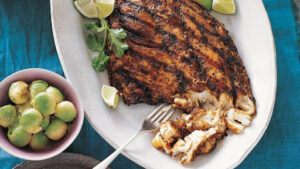
Introduction
Winter is the season in which your body needs some extra love and care. Changes in the temperature and air condition around your body have a significant effect on the way your body functions. Your rate of metabolism changes with the weather and so does your energy consumption. This is why you are not only required to take extra care of your skin in winter but have to make proper changes to your diet as well.
The following blog contains a detailed account of the foods you should add to your diet in winter to keep your energy levels high and your body warm. We are giving you some easy and healthy snacking ideas as well to satisfy your cravings on long winter nights. It also includes tips to keep your body hydrated in winter.
Foods to include in your winter diet
1. Soups
Soups are one of the best meals in winter. Soups not only give you warmth on cold winter days but are also a great boost to your immunity. Since soups are mostly light in weight, they don’t put much strain on your digestive system and thus can be consumed at night. Soups also aid in hydration and they freeze well so can be prepared and stored in bulk.

2. Air-fried or grilled fish
Fish is a very good source of omega-3 fatty acids, calcium, phosphorus, minerals, and vitamins such as D and B2. It is an integral part of a healthy diet. Consuming fish in winter serves a lot of benefits. It keeps you warm and protects your skin from getting dry. Omega-3 present in fish helps in relieving the pain of arthritis in the elderly as well. By improving the health of the lungs, fish consumption can aid in relieving the discomforts of winter infections. To make it healthier, opt for air-fried or grilled fish.
Figure 2 Source
3. Lentils and pulses
Lentils, pulses, peas, and beans are good options for vegans and vegetarians to include protein in their diet. Along with proteins, these are a good source of vitamins, minerals, and antioxidants. Packed with flavor, these can be easily incorporated into curries and soups to keep you warm in winter. You can also start your day by making yourself some hot lentil porridge to get warmed up for the day.
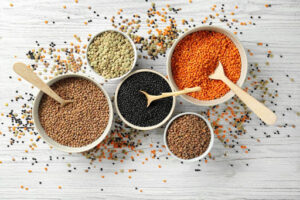
4. Leafy greens
Winters also bring various types of leafy greens, commonly called Saag. These greens, especially sarsoon ka saag or Mustard leaf greens are popular dishes in winter due to their nutritive value. Most saags are rich in iron which helps in elevating your levels of hemoglobin. They also help in building immunity, improve heart and digestive health, and help you fight against common winter infections.
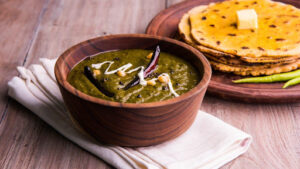
Healthy snacking option for the increased winter appetite
Increased appetite and long winter nights may make you want to stock up on your snacks. Since physical activity in winter is usually lower than in summer, you are more prone to putting on some extra unhealthy weight. This is why you should have some healthy snacks to go to satisfy your mid-day and late-night cravings. Some of the healthier options are;
1. Seasonal fruits
The best way to snack in any season is to eat fruits. Winters brings you amazing fruit options including oranges, cranberries, pomegranates, pineapples, kiwis, and pears. Most of these fruits are packed with fibers and nutrients especially vitamin C which is great for your skin and helps in fighting infections.
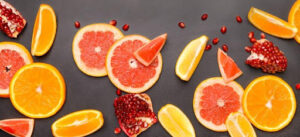
2. Raw or steamed veggies
Along with fruits, winter brings us delicious and nutritious vegetables which can be used for snacking. Try consuming raw or steamed veggies to make the most nutrients out of them. The common vegetables of winter are broccoli, carrot, potato, onion, spinach, fenugreek, beets, mustard, cabbage, cauliflower, lettuce leaf, peas, coriander, mint and garlic. You can also incorporate most of these vegetables to make healthy and crunchy salads.
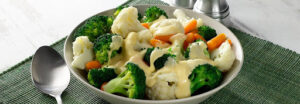
3. Other winter delicacies
Many other delicacies are available for snacking in winters. These snacking items are not only delicious and favor-full but are also packed with ingredients that help you stay warm and fight winter infections. These items include till k laddu (sesame seed balls), Gurr ki mithai (jaggery dessert), roasted or steamed sweet potato, corn, green chickpeas, etc.
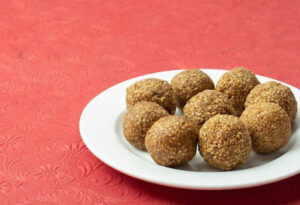
4. Dry fruits
Eating dry fruits is another healthy yet delicious snacking option. Most dry fruits are packed with an adequate amount of fiber and antioxidants, mainly polyphenols. Fibers help in digestion and satisfying your cravings whereas antioxidants provide numerous health benefits including improved digestive health, immunity, blood flow, and decreased oxidative damage. However, you must keep an eye on your calorie intake while snacking on dry fruits and avoid dry fruits with added flavorings.
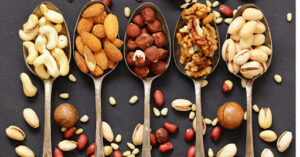
5. Boiled eggs
Eggs are an excellent source of proteins and help you feel full. Warm-boiled eggs can not only keep you warm but can also improve your brain health, manage your weight, increase healthy cholesterol, and boost your immunity.

6. Dates
Dates also help you keep warm in winter owing to their high fiber and antioxidant content. Dates are a great source of iron, calcium, vitamins, and magnesium. To gain the maximum benefits of dates, you can consume them with milk. Dates help in controlling blood pressure, maintaining heart health, and easing constipation. They are also an excellent choice for a post-workout snack due to their energy-boosting properties.
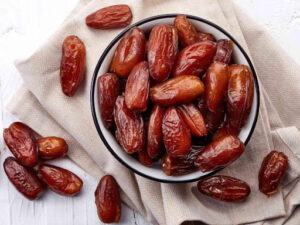
Remember to stay hydrated
Being mindful of hydration is highly important in winter. Since you cannot notice sweat in all the layers of clothing, you have to be more regular about your water intake. Sipping water throughout the day will not only improve the texture of your skin but will support your body in fighting against infections. Staying hydrated also helps in the distribution of heat throughout your body and helps you stay warm.
Some common ways to stay hydrated in winter include;
- Keep water accessible to yourself. Carry a refillable water bottle around so that you don’t have to wait or delay drinking water anytime you get thirsty.
- Make your water flavorful by adding the extract of fresh fruits to it. You can also add frozen slices of seasonal fruits to add flavor and color to the plain, boring water.
- Opt for water with your meals rather than choosing sugary beverages. Soda, cold drinks, and energy drinks don’t provide hydration and thus should be avoided.
- Fruits and vegetables also contain a significant amount of fluids in them. So snacking on fruits and veggies is an easy way to add extra fluid to your diet.
The majority of people think that they cannot get dehydrated in winter. Signs of dehydration in winter are more concealed and thus you need to pay extra attention to them. The key signs of dehydration include flushed skin, dark urine, dry mouth, muscle cramps, dizziness, increased heart rate, headache, etc.
Takeaways
You need to take care of your body from both the surface and within in winter. By taking adequate amounts of antioxidants, fibers, omega-3 acids, and good cholesterol, you can keep your body happy and healthy. However, it is important to consume these items in moderation. Always consult with your nutritionist or dietician before making any significant changes to your diet if you have any specific conditions including heart disease and diabetes. To take expert advice, consult Sehat Kahani’s experts on the go using their mobile application.
FAQS
Does appetite increase in winter?
To keep you warm during winter, the body simply needs more fuel to burn which increases appetite. A significant portion of the diet you take is utilized to form heat energy for the body which increases your hunger in winter.
Does eating dry fruits cause pimples?
Almonds and walnuts contain rich amounts of omega-3 and antioxidants which are considered good for the skin. However, too many of these can cause acne and redness. This is why if you have acne-prone skin, you should be mindful of your dry fruit consumption.
Are oranges going to worsen winter flu?
Oranges are a rich source of vitamin C. Adequate amounts of Vitamin C can help in curing your flu faster and may boost your immunity. However, if you have a sore throat then you should avoid oranges as their acidic nature might irritate the already sensitive surface of the throat.
Do I still need to stay hydrated even if I am not sweating during winter?
Proper nutrition coupled with hydration is highly important for the optimal functionality of the body, especially during winter. In the cold and dry weather, to keep the body warm and skin supple, adequate hydration is required. Hydration also helps in the distribution of heat in the body and thus prevents hyperthermia.

